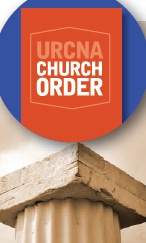The church order of any denomination or federation is only as beneficial as the integrity of the churches that have covenanted to abide by the articles they have mutually adopted. The Christian Reformed church order recognized this commitment in Article 96, “This Church Order, having been adopted by common consent, shall be faithfully observed, and any revision thereof shall be made only by synod.” Yet, the Christian Reformed Church (CRC) had a history of undermining and ignoring its church order. The CRC’s Church Order Article 3 is a prime example. This article stated, “Confessing male members of the church who meet the Biblical requirement for office-bearers are eligible for office.” This article’s authority was undermined in several stages.
First, the synod of the CRC changed this article by allowing women deacons to be ordained. Second, the CRC changed the translation of Belgic Confession Article 30 to be gender inclusive. Third, numerous local congregations ignored this article and started ordaining women into the office of elder. These local churches lived as if this article did not apply to them. There were attempts made at the synodical level to have these churches honor the church order, but these attempts failed. Fourth, after repeated attempts to change this church order article failed, the synod of 1995 ignored the normal process of changing the church order by declaring Church Order Article 3 to be “inoperable.”
The CRC’s official website summarized these years of turmoil in the CRC, which ignored biblical truth and practiced ecclesiastical manipulation, with these words: “Synod 1995 recognized that there are two different perspectives and convictions on this issue, both of which honor the Scriptures as the infallible Word of God, and decided to give classes the option of declaring the word male in Church Order Article 3 inoperative, thereby allowing their churches to ordain women to all the offices.” This synod declared not only this church order article inoperative; it also made inoperative the church order article explaining how to change the church order. It was more ten years later that the Christian Reformed Church changed its church order: “Synod 2006 proposed and Synod 2007 decided to delete the word male from Church Order Article 3.”

A number of CRC local congregations left in 1995 and 1996 and joined the Untied Reformed Churches of North America (URCNA). One reason for many was the failure of the Christian Reformed Church to “faithfully observe” the church order. Those leaving believed that the historic Christian Reformed Church’s church order had faithfully reflected the truth of God’s Word. Certainly failure to honor the Word of God and the confessions were in many ways more significant. But covenant breaking took place on many levels. Breaking covenant by breaking the church order was just one of the ways that unfaithfulness expressed itself.
The repercussions of any group of churches ignoring their own church order are significant. So, is the URCNA faithful to its church order? Do we as local churches declare inoperative by word or deed the covenant we have made together in our church order? Given the facts that many local churches in URCNA left in frustration a denomination that ignored the church order and that we are less than twenty years old, one would think that we would not even need to ask such a question. However, I believe the question needs to be asked. The URCNA church order states, “These articles, relating to the lawful order of the church, have been so drafted and adopted by common consent, that they ought to be observed diligently.” The original local congregations adopted the church order by common consent; all local churches joining the URCNA added their voices and agreed to observe diligently the church order. It is a covenant reflecting the fellowship, common practices, and doctrinal unity of the churches. Some articles are rooted in doctrinal truth that cannot be compromised. Other articles apply biblical principles for good order enhancing fellowship and justice.
There are a number of individuals and churches that I believe have undermined the authority of the church order in the life of the URCNA. Some local churches declare one article or another inconvenient or irrelevant to their particular situation and ignore the church order. This will harm the churches because the church order is the wisdom of the past expressed in our unity and life in Christ summarized within the context of our confessions. Confessions postulate our unity in doctrine. The church order promotes our unity in action. We submit one to another as we share a common church order.
I have observed and heard about several articles moving to the inoperative stage in the young life of the URCNA. Church order articles are being skirted, ignored, and changed with actions that are inconsistent with a common commitment to practices that we have affirmed. All consistories are called to encourage godly Christian education. Is every church practicing two worship services each Lord’s Day? Are we practicing terms for the office of elder and deacons? Are we practicing lifelong calling for the ministry of the Word? Do we make proper distinctions regarding ministerial separations from a local congregation? According to the church order, a minister and consistory have promised to work together until the minister accepts and the consistory approves a call, an “article 11” that recognizes an intolerable situation is ratified by classis, the minister dies, or the minister retires. A consistory cannot inform a minister he is fired. A minister cannot inform a consistory that he quits. Principles of office and good order demand that we closely examine these situations and ask ourselves, “Are we diligently following the church order?”
1. Church Order of the Christian Reformed Church in North America, Psalter Hymnal (Grand Rapids, MI: Board of Publications of the Christian Reformed Church), 208. 2. Ibid., 192. 3. http://www.crcna.org/welcome/beliefs/position-statements/women-ecclesiastical-office. 4. Ibid. 5. https://www.urcna.org/sysfiles/member/custom/file_retrieve.cfm?memberid=1651&customid=23868.
Rev. Casey Freswick is pastor of Bethany United Reformed Church in Wyoming, MI.
